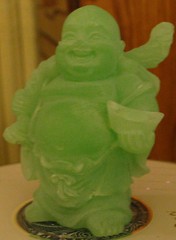This week I’m posting my first ever fiction story to appear on this blog. It also happens to be the first short story that I have ever written to fit the 140-character Twitter format, and was published via @pancakebooks (stupid name, I know) earlier this week.
My inspiration for this form comes from Jennifer Egan’s short story “Black Box,” originally published on Twitter and then in The New Yorker.
Voila. Hope you enjoy.

Shrapnel
The day before my grandfather’s entire platoon was wiped out—all except for him—they spent the afternoon digging trenches in a Korean graveyard.
A man from a nearby village had begged them to stop. It was bad luck, he told them. No good would come of it. They would be cursed.
But the Chinese were on the other side of the hill. It was war. They did what they had to do, and my grandfather was the Lieutenant.
He told them to keep digging.
In all likelihood, they unearthed bodies as they dug. Yellowed bones, human hair. But my grandfather didn’t talk to us about those things.
He was a storyteller. He told us instead of another discovery: a jade Buddha, sea green and the size of his hand.
When the Korean man from the village saw it, he started crying.
Who knows how long the Buddha lived there, under the earth—centuries? My grandfather was the Lieutenant. He put it in his knapsack.
A souvenir.
That night the men used the grave stones for washboards. They ate from their mess kits, joked about home—how they’d never eat rice again.
A private in my grandfather’s unit, Eddie from Kentucky, stayed up one night to finish a book. Get some sleep, the guys told him.
It was a damn good book, though, and he’d wanted to finish it. Eddie read the last chapters by the beam of his military-issue flashlight.
The next morning, the Americans were overrun. Bullets strafed the air. Smoke rose in plumes, then clung to the ground in low, dark clouds.
A bullet slid through Eddie’s chest and pierced his lung. He died choking for breath, unable to speak.
But he finished it, my grandfather said. What was the book? I asked. The Call of the Wild, my grandfather said.
The rest of my grandfather’s unit died around him.
My grandfather was lucky. He heard the grenade as it dropped over the wall of the trench, as it danced down the concrete steps.
One, two—and he lunged sideways—three.
When I was young I ran my finger across the scars, over the jagged shrapnel that racked his body and crawled like spiders under his skin.
By the time he died—62 of cancer—he’d had 12 operations. At 58, the metal still wriggled inside his leg, searching out an artery.
After the war, my grandfather came home and went back to college. He met my grandmother, they married, and life happened.
They had three girls. One, two—and a gap of six years—three.
My grandmother still tells the stories my grandfather told her about the war, about his childhood.
I try to pay attention to how they warp and bend over time. How her memory matches up against mine, against my aunts’, against my mother’s.
Who’s to say who’s right?
Memory works like shrapnel. Long after a callus has grown over a wound, memory still cuts inside you. Drawing up new pain or lying dormant—for a time.
Often, my mind goes back to that jade Buddha. My grandmother says it was stolen from my grandfather on his way home from war.
And yet I can’t believe this.
Did I not see it as a child? That soft, green belly, that laughing mouth? Winking at me from some high shelf, or the back of a dark cabinet?
The last few days he was in the hospital, he hallucinated that he was back in Korea.
I was only six at the time, but still. Hadn’t I seen the Buddha, clenched in the grip of his sweating hand?
Begging for one last miracle, all the while still crouched in the trenches, the ping of the grenade hitting against the concrete steps.
One, two—yes, hadn’t I seen it then?—three.
![]()
